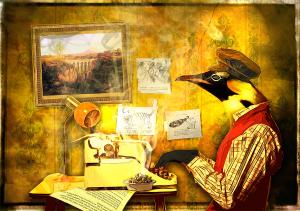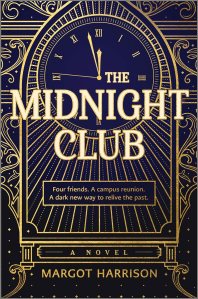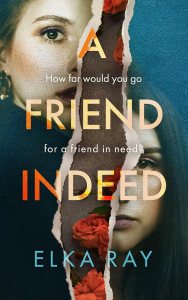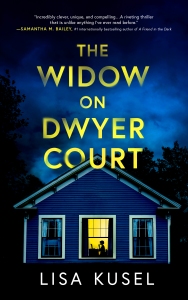Sisters In Suspense
- Lisa Kusel

- Jun 27, 2024
- 4 min read
Updated: Apr 30, 2025

My PR team at Blackstone Publishing, a fantastic group of smart, savvy women, is all about GETTING THE WORD OUT before my new book’s release. They're on it—media outreach, sending advanced copies for reviews, pitching to podcasters and bloggers, and so much more.
As the author, I'm also expected to drum up some notice. It's basically a full-time job, finding ways to stand out among the sea of competing titles.
One key marketing tool? Writing a personal essay about some intriguing aspect of the book. A theme, a list—something that promotes the book while also entertaining.

So, I wrote an essay for CrimeReads, a must-do for any suspense writer with a new release. I thought it hit the mark: plugging my book without being too obvious. I sent it to the team and waited. A few days later, I got an email: the essay didn’t “tout” my own book enough.
Oh well. Never one to let a good essay go to waste, I give you:
COMRADES IN CRIME
I was having such a difficult time coming up with an original topic to write about for a CrimeReads piece that I did what any flailing writer would do: I reached out to a few of my writer friends.
“OMG, I have no idea what to write about. I feel like it’s all been done before,” I whined across a smattering of emails.
I told them that I’d thought about writing about the dark humor scurrying around The Widow on Dwyer Court, but there was already an excellent essay about humor in crime fiction. I said that delving into the subject of suburban intrigue had also been done. As for adultery? Back in 2021 Peter Swanson wrote about infidelity in suspense novels, summing up the trope’s incendiary powers so perfectly, I knew I couldn’t add to his insight:
One of the reasons adultery works so well in the realm of suspense fiction is that it can so often snowball into criminal acts. It’s a doorway to lies, to blackmail, and to murder, of course; and it also makes the adulterer vulnerable, desperate to cover up their acts.
It wasn’t by coincidence that I entreated these particular writers. All three of them read my new book and all three have their own thrillers coming out. I figured this task was already taking up some of their brain space.
The first writer friend I approached was Margot Harrison, author of the forthcoming The Midnight Club (Graydon House), “a twisty nostalgic thriller that explores that innate desire to revisit our first loves, our biggest mistakes, and the gulf between who we are and who we hoped we’d be.”

Partly fantastical, partly mysterious, wholly suspenseful, I had a blast reading Margot’s novel.
Margot immediately suggested I write about the sexual orientation of my main character, Kate, who, although she is asexual, writes erotica novels using her husband’s affairs. Margot, one of the most well-read humans I know, said she couldn’t recall any adult thrillers starring such a unique protagonist.
I ruminated on this facet of the book for a few days, but didn't want to write an entire essay about Kate's sex life.
Next I emailed Liz Alterman, whose thriller novel, The House on Cold Creek Lane, “an unflinching examination of motherhood and the dark side of domesticity set against a suburban backdrop that's anything but blissful,” comes out in August (Severn House).

I found Liz’s book to be the quintessential domestic suspense thriller filled with all the expected and unexpected tropes so beloved by thriller fans. I devoured it. Without a moment’s hesitation Liz said, “Write about the fact that Kate is a writer. I love reading books about writers writing!”
True, Kate’s writing life is a central component of the novel, but I wasn't sure how to frame it. I could make a list of other novels where the main character is a novelist, three of which I'd recently read: A Flaw in the Design, by Nathan Oates; Erasure, by Percival Everett; and Gilly Macmillan's To Tell You the Truth.
It wasn't a bad idea, but neither was it a great one. Ultimately, I didn’t want to pitch a listicle to CrimeReads.
That’s when I asked Elka Ray, another thriller writer whose new book, A Friend Indeed, “a riveting tale about the power of friendship and the deadly weight of lies,” hit the shelves on May 16 (Blackstone Publishing).

Because Elka writes like a bat-out-of-hell, I felt very much embedded in the lives of the two main characters in this book from page one. Her book is a solid thriller.
Elka and I brainstormed over email for a few days, with her deciding that my crazy idea to write about how dogs play an important role in The Widow on Dwyer Court is pretty cool. I thanked her for her help, opened a WORD document, and stared at the blank page. My novel was a suspense book! I couldn’t reveal how I used a dog as a murder weapon.
Once again, I had nothing.
No, actually, what I had was something much greater. In the midst of trying to excavate some precious element about what makes The Widow on Dwyer Court shine, what I found instead was gratitude. Gratitude for having fellow writers in my life: women who didn’t mind putting aside their own work so that they could help me find the right words.
PS. I did finally manage to think up a rather noteworthy aspect of the novel to write an essay about. Go read it.







Comments